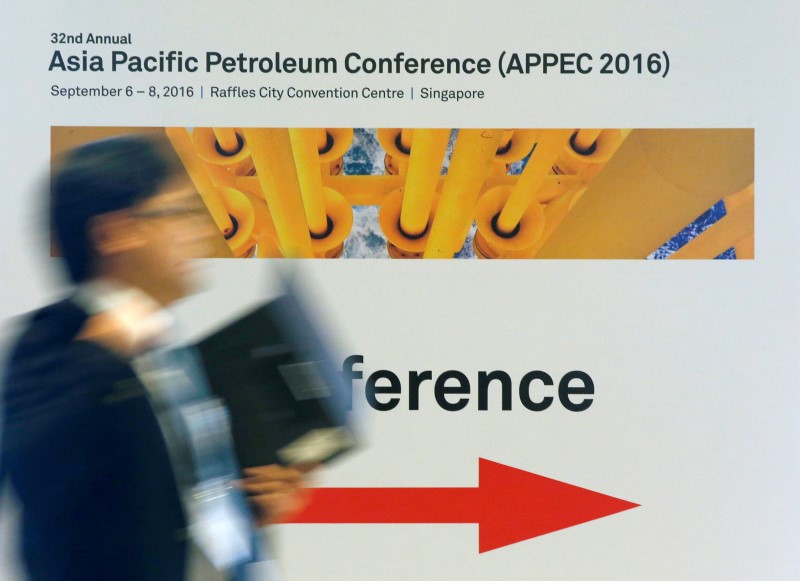By Henning Gloystein and Florence Tan
SINGAPORE (Reuters) - Conspicuous consumption, mostly liquid, has long been a feature of Singapore's annual APPEC oil gathering, but it is a more sober affair in 2016, as executives in the third year of an industry downturn keep a clear head for deal opportunities.
There are still takers for the many dinner and cocktail receptions, but with oil prices down about 60 percent since mid-2014, and refinery margins hitting multi-year lows in August, delegates are putting business before partying to compete in a volatile and cut-throat market.
"Last year, there was a large roof-top event that went all night, and people were rolling out at 6 or 7 a.m.," said a Singapore taxi driver. "This year, the big events all finished at midnight or 1 a.m. tops, and only the die-hards stayed out later.”
A transformation in the Chinese oil market with the advent of the "teapot" refining industry - a batch of independent refiners with import licences - has also introduced a new source of demand for producers to fight over at the 32nd Asia Pacific Petroleum Conference this week.
"There is a need to be very entrepreneurial, to find out your customer," said Jorge Montepeque, Senior Vice President at ENI (MI:ENI) Trading and Shipping, the trading branch of Italian energy major ENI.
Andy Milnes, chief executive for global oil and gas firm BP's Integrated Supply & Trading in the Eastern Hemisphere, said at a Financial Times commodities event in Singapore that his firm had made big efforts to engage with China.
This included packing its China team predominantly with Chinese nationals, which Milnes said had made a big difference in terms of customer relations and "understanding the needs and opportunities out there".
Oil producers like BP (LON:BP) and Statoil (OL:STL) and traders like Trafigura have recently entered deals with teapots, and APPEC attendants said others were lining up to follow suit.
The 16 teapots together import 1.3 million barrels of crude per day, equivalent to more than 10 percent of overall Chinese imports.
"Business is good. We're being courted," said one teapot delegate.
BASIC BUBBLES
In previous years, the executives, traders, brokers, exchange staff and sales and marketing teams who flocked to APPEC showed scant enthusiasm for the conference events, which were sparsely attended.
"As visitors swarmed to industry celebrations, hospitality suites and corporate outings during APPEC week, conference attendance declined sharply," said John Driscoll, director of JTD Energy Services in Singapore, who has been attending APPEC since its first year in 1985.
In a sign of leaner times, Angolan state oil producer Sonangol was serving $50-a-bottle Veuve Clicquot champagne at its APPEC party this week. Before the downturn, delegates were treated to Dom Perignon, about four times the price.
The change in atmosphere this year is also in part because oil price reporting agency S&P Global Platts, which competes with Thomson Reuters to provide news and information to energy markets, has taken over as conference organiser from local company Ace Connections and Events.
Along with smaller rivals like privately held Argus Media, Platts, part of the group that , provides prices for physical oil and refined products - influencing cargoes worth billions of dollars every day.
"Our plan is to build out the APPEC conference as the premier thought leadership event for the Asian energy market," said Sarah Whipp, Head of Marketing and Conferences for Platts, part of the group that also owns ratings agency Standard & Poor's.
Platts' proposals to change the way it prices gasoil, a key refined product, has also given the conference particular relevance this year.

"As the purveyor of the Asia's key price methodologies for crude and products and the custodian of the daily Market on Close (MOC) window, Platts' can command the undivided attention of traders," said Driscoll.